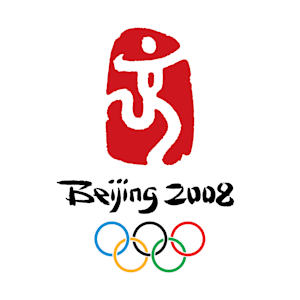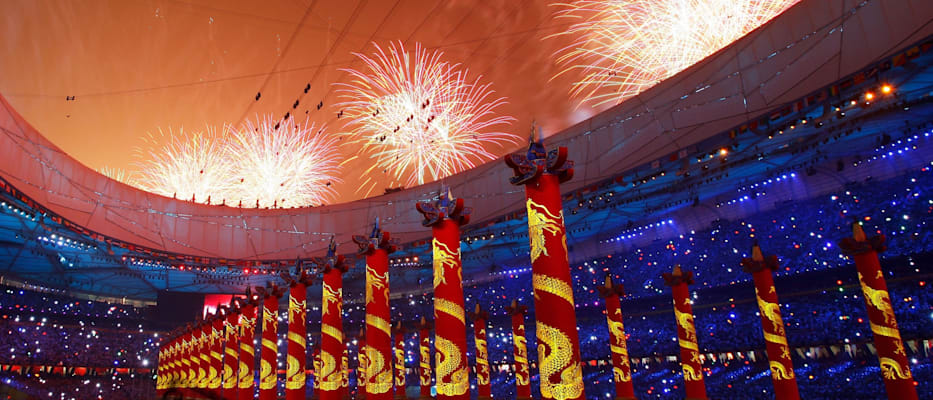Beijing was the Games of records and superlatives. The Opening Ceremony was unforgettable; the athletes’ achievements were astonishing, the organisation was excellent; the venues, breathtaking and the anti-doping tests were stricter. Several hundred million watched worldwide on TV as more than 40 world records and over 130 Olympic records were broken.
The National Stadium, nick-named the “Bird’s Nest”, and the National Swimming Centre, known as the “Water Cube”, were both stunning symbols of the new Beijing. In cycling, the road race followed the Great Wall and passed in front of the “Forbidden City”—two symbols of the thousand-year-old history of the city.
A record 204 National Olympic Committees took part in the Games. Some 87 of them celebrated their medal-winning athletes. Tajikistan, Afghanistan, Mauritius and Togo all experienced podium finishes for the first time. Tajikistan won its first medals thanks to Rasul Boqiev in judo and Yusup Abdusalomov in wrestling; Afghanistan stepped up on to the podium thanks to Rohullah Nikpai in taekwondo.
However, Mongolia and Panama managed to go one better with their athletes bringing home their country’s first Olympic gold. Badar-Uugan Enkhbat in boxing and Tuvshinbayar Naidan in judo were the first athletes from Mongolia to win a gold medal at the Olympic Games. For the African continent, Bruno Julie in boxing and Benjamin Boukpeti in canoe/kayak offered Mauritius and Togo respectively their first Olympic medals, while Panama took its first gold medal in athletics.
Memorable Champions
There were many memorable champions, but it was Michael Phelps and Usain Bolt who stole the headlines. Phenomenal U.S. swimmer Michael Phelps bettered Mark Spitz’s achievement at the 1972 Munich Games by claiming eight swimming golds, and the incredible Jamaican sprinter Usain Bolt broke both the 100m and 200m world records and claimed a third gold and record with the Jamaican 4 x 100m relay team.
NOCs: 204
Athletes: 10,942 (4,637 women, 6,305 men)
Events: 302
Volunteers: 100,000 (70,000 Olympic Games, 30,000 Paralympic Games)
Media: 24,562 accredited media representing 159 countries
New Events at the Games
The 10km swimming marathon and BMX. Dutchman Maarten Van Der Weijden won the men’s 10km marathon, while in the women’s race, the title went to Russia’s Larisa Ilchenko. In BMX – short for Bicycle Moto Cross – it was France’s Anne-Caroline Chausson who became the first Olympic champion. For the men, this honour went to Latvia’s Maris Strombergs.
The Oldest World Record Smashed in Swimming
The women’s 800m record had been held by Janet Evans (USA) for almost 20 years. But in Beijing, Great Britain’s Rebecca Adlington smashed this record, which had been set in 1989 when she was only six months old. In 2008, in the 800m final, Rebecca Adlington improved on the previous time by more than two seconds, with a new time of 8:14.10. She took the gold medal in the 800m and in the 400m, and became the first British gold medallist in women’s swimming since 1960.
The Oldest and Youngest Participant in the Games
In Beijing, almost 50 years separated the oldest from the youngest athlete: Japanese horse rider Hiroshi Hoketsu took part in his third Olympic Games at the age of 67, whilst Cameroon swimmer, Antoinette Joyce Guedia Mouafo participated in the Games for the first time at the tender age of 12.
Age is not Necessarily a Disadvantage
With his ninth participation in the Games and at the age of 61, Canada’s Ian Millar won his first medal in the team jumping event. At 33, and with her fifth participation in the Games, Germany’s Oxsana Chusovitina won the silver medal in artistic gymnastics, while U.S. swimmer Dara Torres took three silver medals at the age of 41.
Ultramodern Sports Facilities and Thousand-year-old History
The National Stadium, re-named the “Bird’s Nest”, and the National Swimming Centre, known as the “Water Cube”, were avant-garde models of sports architecture and the symbols of the new Beijing. In cycling, for the road race, the organisers chose to follow the Great Wall and pass in front of the “Forbidden City”—two symbols of the thousand-year-old history of the city.
Thirty-seven venues, six of which were outside Beijing, hosted the competitions: namely Hong Kong for the equestrian events and Qingdao for the sailing; and Tianjin, Shanghai, Qinhuangdao and Shenyang for the football matches. Six of the sports facilities located on the city’s university campuses are used by students after the Games.
Ceremonies
8 August 2008, Beijing, Opening Ceremony of the Games of the XXIXe Olympiad. The last runner of the Olympic Torch relay Li Ning prepares to light the Olympic cauldron.
Official Opening of the Games by:
President of the People's Republic of China Hu Jintao
Lighting the Olympic Flame by:
Li Ning (artistic gymnastics)
Olympic Oath by:
Zhang Yining (table tennis)
Officials' Oath by:
Huang Liping (gymnastics)


